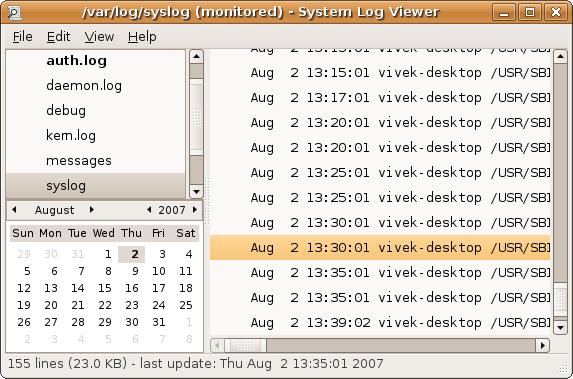All logs are stored in /var/log directory under Ubuntu (and other Linux distro).From[1]Linux Log files and usage
=> /var/log/messages : General log messages
=> /var/log/boot : System boot log
=> /var/log/debug : Debugging log messages
=> /var/log/auth.log : User login and authentication logs
=> /var/log/daemon.log : Running services such as squid, ntpd and others log message to this file
=> /var/log/dmesg : Linux kernel ring buffer log
=> /var/log/dpkg.log : All binary package log includes package installation and other information
=> /var/log/faillog : User failed login log file
=> /var/log/kern.log : Kernel log file
=> /var/log/lpr.log : Printer log file
=> /var/log/mail.* : All mail server message log files
=> /var/log/mysql.* : MySQL server log file
=> /var/log/user.log : All userlevel logs
=> /var/log/xorg.0.log : X.org log file
=> /var/log/apache2/* : Apache web server log files directory
=> /var/log/lighttpd/* : Lighttpd web server log files directory
=> /var/log/fsck/* : fsck command log
=> /var/log/apport.log : Application crash report / log file
To view log files at shell prompt
Use tail, more, less and grep command.
tail -f /var/log/apport.log
more /var/log/xorg.0.log
cat /var/log/mysql.err
less /var/log/messages
grep -i fail /var/log/boot
View log files using GUI tools using the GNOME System Log Viewer
System Log Viewer is a graphical, menu-driven viewer that you can use to view and monitor your system logs. System Log Viewer comes with a few functions that can help you manage your logs, including a calendar, log monitor and log statistics display. System Log Viewer is useful if you are new to system administration because it provides an easier, more user-friendly display of your logs than a text display of the log file. It is also useful for more experienced administrators, as it contains a calendar to help you locate trends and track problems, as well as a monitor to enable you to continuously monitor crucial logs.
You can start System Log Viewer in the following ways:
Click on System menu > Choose Administration > System Log

(The GNOME System Log Viewer)
Note you can start the GNOME System Log Viewer from a shell prompt, by entering the following command:
$ gnome-system-log &
[1]www.cyberciti.biz/faq/ubuntu-linux-gnome-system-log-viewer/